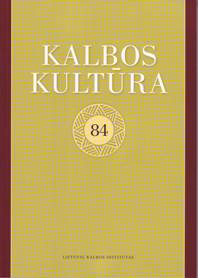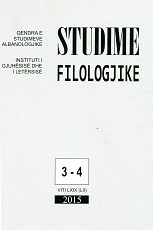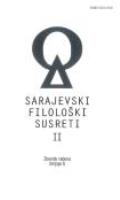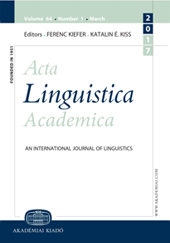Author(s): Ramunė Vaskelaitė / Language(s): Lithuanian
Issue: 89/2016
The paper investigates the tendencies of the non-use of pronominal forms (hereinafter – PFs) as morphological markers of terms. Based on the two types of data sources, namely, (a) full and coherent texts, i.e. research articles on economics, and (b) de-contextualised data, i.e. dictionaries of economics and glossaries of terms and concepts provided in different legislative acts, the research aims to determine both the recurrent patterns of the non-marking of a term with a pronominal form and the factors influencing the attested actual use and its divergence from the codified norm, which prescribes the obligatory marking of a term with a pronominal morphological marker.A special attention is given not only to the use of PFs but also to the codified norm itself. The latter is discussed in a wider context: the paper deals with the use of PFs in accordance with other norms allowing different meanings, the classification of those meanings and the overall evaluation of PFs in scientific discourse. The results show that the norm is not consistent: the insistence on the obligatory marking of a term is based on the potential property of a PF to mark the type of an object; however, the marking of a type as being absolute is not prescribed by the norm. This feature is considered to be a very common function of PFs in both empirical and prescriptive studies; however, a few exceptions can be made. The classification of the meanings of PFs provided in the literature presupposes even more exceptions as the marking of types of objects is considered as one of the subcategories of definiteness. The meaning of definiteness (definiteness marking) is discussed in the light of possible exceptions, such as the substitution of PFs with short forms in the cases when an adjective carries a specific lexical and figurative meaning and is used in the superlative degree, etc. Thus, it could be concluded that such exceptions should be applicable to one of the subcategories of definiteness – the marking of types of objects. In general, the opposition between pronominal and short forms in empirical and prescriptive studies is treated as a continuum allowing in-between cases.Undoubtedly, the prescription of the use of PFs as term markers may follow a different argumentation path; however, neither the latter nor the relation between the marking of a term or object type and marking of types of objects or expression of definiteness is revealed. So, adding a term-forming morpheme leads to sticking to patterns typical of the marking of types of objects or the general rules of PF use.The results obtained confirm the fact that the actual use of PFs corresponds with the mentioned patterns in particular, taking into account different exceptions of the non-use of PFs, i.e. their non-occurrence with adjectives that have a specific lexical meaning or are used in the superlative degree and with words used figuratively. What is more, the findings contribute to the elaboration of the list of exceptions, namely, the non-use of PFs with international words and some participles. The analysis also reveals the importance of context, which is a crucial factor in PF use that has been often overlooked in prescriptive studies.The attested tendencies of PF use are in line with the findings presented in different papers in which not only various exceptions of the use of PFs but also the criterion of their use as term markers are outlined. This criterion is not straightforwardly defined; however, the analysis of the norm postulates reveals that it could be considered to be the term and non-term opposition, i.e. a PF is a marker that distinguishes word combinations used as terms from the ones featuring as non-terms. In a scientific text it is not only a PF that is a marker of a word as a term; there are other indications such as the high frequency of the same word combination, its concept, provided definitions, etc. Given there are such markers, the use of PFs as term markers in a scientific text becomes superfluous.If a PF obviously performs a distinguishing function, i.e. gives a different meaning to a word combination, it is used regularly in scientific texts as well as dictionaries of terms. However, the use of PFs trying to fully comply with the norm of their general use and their use as term markers results in inconsistencies. There may even be exceptions for each individual case. Thus, the principle of systematic organisation, which is of paramount importance in the use of terms, is flawed.Such a situation sets some tasks for codification. First, the criterion of the use of PFs as terms markers should be defined more clearly; second, the relation between the marking of terms and marking of types of objects should be defined more properly. Moreover, the present analysis may also pose a more conceptual question – one is to decide whether a PF should be further considered to be an obligatory marker of a term or whether some major exceptions regarding the general use of PFs and their use as definiteness markers should be allowed. A conclusion could be made that, if one chooses the first option, the use of PFs as term markers would become more systematic. If the second option is chosen, the use of PFs would continue to be inconsistent and, as has been attested in empirical studies, this would lead to the weakening of the function of PFs and their gradual disappearance in the use of term marking. Furthermore, the analysis shows that, adopting further language standardisation solutions, the factor of context should be taken into account. The similarities and differences of the use of PFs in academic, administrative and everyday discourse still need further investigation.
More...












